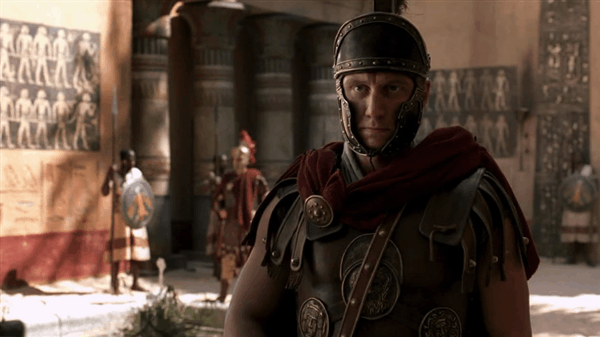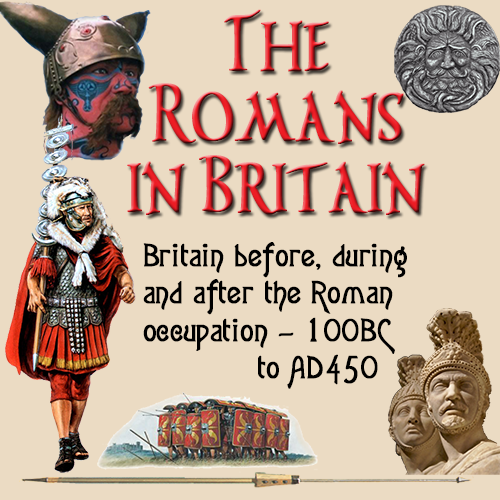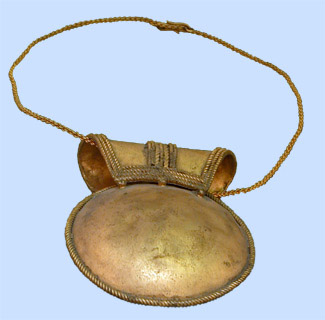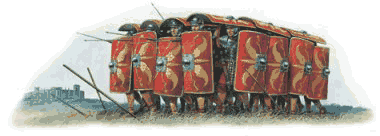From a Boy to a Man
by Victius Maximus
RiB Staff
In this page, we look at life during the Roman occupation for a child from the early days, to the time when he gains his manhood. This is seen from a male point of view, as all my sources on this give the perspective of a boy growing up. There will be a page later for a female child.
Basic education
 If the child was from a family of affluence, he was cared for by a nurse when he was young, who was in close contact with his mother throughout his young life. As he grew older, his father would take over the grooming of him, not only in education, but in all things Roman. Games, riding, hunting, fighting, all would be learned from his elder. The boy would also learn of his family and how they achieved their place in society, and how he too would be great one day.
If the child was from a family of affluence, he was cared for by a nurse when he was young, who was in close contact with his mother throughout his young life. As he grew older, his father would take over the grooming of him, not only in education, but in all things Roman. Games, riding, hunting, fighting, all would be learned from his elder. The boy would also learn of his family and how they achieved their place in society, and how he too would be great one day.
|
|
At the age of seven, the boy was given a Greek slave paedagogus whose purpose was to teach the boy Greek and to be responsible for his behaviour and personal appearance. This slave would be his constant attendant and follow him wherever he went. In many cases the slave would also teach the boy to read, write and perform simple arithmetic. The child would probably go to a Primary school ludus where he would be taught by a schoolmaster ludi magister. The exception to this would be the extremely wealthy who could afford private tuition for the first five years of their son's education.
The school day
The day would start at dawn and break at midday, then resume until mid afternoon. Not all schools were totally enclosed, with some being open at one end onto the street. There were no desks, just wooden benches which the children sat on, resting their wax tablets, on which they used to write, on their knees. There were good and bad teachers, an one commentator, Martial wrote
You rascally schoolmaster, hated by the girls and boys in your class, why do you disturb your neighbours? Though the cock has not yet crowed, you shatter the silence with your savage threats and cruel blows.
This was unkind, since the teachers were poorly paid. What a schoolmaster earned in a year, someone, say a charioteer, could earn in one day.
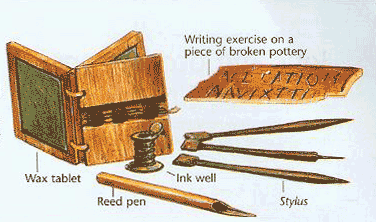
The higher school
The Romans placed great emphasis on education right from an early age to the time of manhood. A son from a wealthy family would have been educated to a high standard at a Grammaticus. Most children did not reach this stage and went on to a working life. Bu for those who stayed the course, the Grammaticus made them work hard to study at grammar and literature. There were numerous readings and analysis of both Greek and Roman works. The ability to memorise long passages and recite them from memory without any aids or prompting was considered a great achievement that many parents would revel in.
The lessons were long and hard with severe discipline, including physical methods of ensuring that the lessons were driven home. The Romans believed that a beating never harmed anyone. Well, not morally anyway. But not everyone believed in the use of extreme tactics. One such schoolmaster, Quintilian, who lived in the first century wrote
I think that a father should have the highest possible hopes for his son, and so will take more trouble over his education from the start. He should make sure that the child's nurse speaks correctly, for although it is important that the nurse is a good person, she should speak correctly too, for it is her words and diction that the child hears first, and he will try to imitate her way of speaking. His paedagogus should either be a fully educated man or should, at least, be aware of his limitations.
A boy should begin his schooling by learning Greek, because he will pick up Latin, which is in general use, whether we like it or not. Shortly afterwards, Latin should be studied, and should rapidly come to play an equal part in his lessons.
Then the teacher should consider how to handle the developing intellect of his pupil. There are some boys who are idle, unless they are pushed along, others who dislike being ordered about; some who can be held in check by fear, others who are paralysed by it; some need continuous practice to develop their minds, others improve most with short periods of intense concentration. But every pupil needs some kind of relaxation, because no one can stand the strain of continuous effort. In any case, learning depends on the enthusiasm of the student, and this cannot be achieved by compulsion. So, fresh after a break he will be sharper and more energetic in his studies.
I strongly disapprove of beating, although it is common practice, for the following reasons. First, because it is an uncivilized form of punishment more appropriate for slaves, and an insult. Second, if a boy is so set in his ways that words cannot hold him in check, he will merely become hardened to beatings.
The future leaders were groomed at these establishments. They were taught how to talk in public and how to influence others with their knowledge.
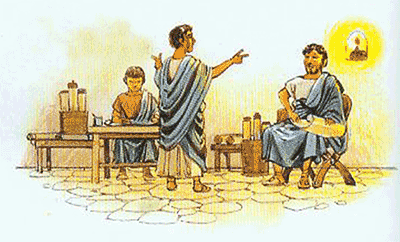
Higher education
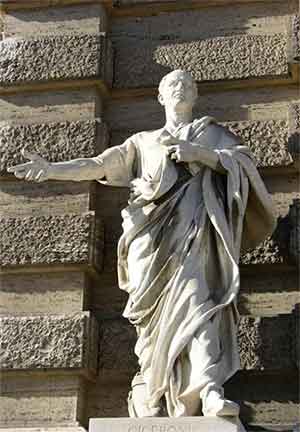 This was the final stage of the boy's education. This was where he learned to turn his public speaking skills into a fine art. The lessons in rhetoric were given by a rhetor, who was a master in public speaking. He would also learn the correct way to research, write and deliver speeches. How to handle debate - and win. Even down to the tone of voice, the emphasis of certain words and the body language to use by means of gestures and posture. There was not set time limit to learn all this, and many students spent years refining their skills and trying out new techniques that they developed over time.
This was the final stage of the boy's education. This was where he learned to turn his public speaking skills into a fine art. The lessons in rhetoric were given by a rhetor, who was a master in public speaking. He would also learn the correct way to research, write and deliver speeches. How to handle debate - and win. Even down to the tone of voice, the emphasis of certain words and the body language to use by means of gestures and posture. There was not set time limit to learn all this, and many students spent years refining their skills and trying out new techniques that they developed over time.
The writer Cicero gave this account of his early life in his final school
 When I was about 16, I used to listen as carefully as I could every day to the most distinguished speakers in Rome, and to write, read and compose speeches. But I had other interests beside these oratorical exercises. The following year I studied civil law under Q. Scaevola, who, though not a teacher, gave legal opinions to those who consulted him. At 18 I listened daily to the speeches of the tribune P. Sulpicius, and got to know his style thoroughly, while at the same time, because of my tremendous interest in philosophy, I became a devoted pupil of Philo, head of the Athens Academy, who had fled to Rome.
When I was about 16, I used to listen as carefully as I could every day to the most distinguished speakers in Rome, and to write, read and compose speeches. But I had other interests beside these oratorical exercises. The following year I studied civil law under Q. Scaevola, who, though not a teacher, gave legal opinions to those who consulted him. At 18 I listened daily to the speeches of the tribune P. Sulpicius, and got to know his style thoroughly, while at the same time, because of my tremendous interest in philosophy, I became a devoted pupil of Philo, head of the Athens Academy, who had fled to Rome.
For the next three years I spent my days and nights in study of every kind. I studied with Diodotus, the Stoic, who came to live at my home. But although I concentrated on his teaching and on all the subjects he was an authority on, I never let a day go by without some exercises in oratory, often in Latin, but more frequently in Greek.
By the time I was 25, I began to undertake cases in the civil and criminal courts, and at this time too I began to study under Molo, the famous orator and teacher from the island of Rhodes, who happened to come to Rome as a member of a delegation of Rhodians. In those days I was very thin and frail physically, the sort of person who everyone thinks is running a great risk if he works hard and puts his lungs and voice under strain. My friends and doctors begged me to stop speaking in the courts altogether, but I was determined to accept any risk rather than give up my ambition to be a famous barrister. But I decided that a more relaxed manner and better voice control would lessen the risk to my health and give me a smoother speaking style, and so I left for Asia.
On my way there, I spent six months at Athens with Antiochus as my guide and teacher, and caught up on my study of philosophy, but at the same time, I continued my oratorical studies under the supervision of Demetrius. Afterwards I traveled through the whole of Asia Minor visiting all the distinguished orators of the area, but not content with this I went to Rhodes and studied with Molo, whom I had already heard at Rome. So, after an absence of two years. I came back to Rome better trained and changed almost out of recognition.
I will never consider it a good report when your tutor merely writes 'Still the same*.
Entry into manhood
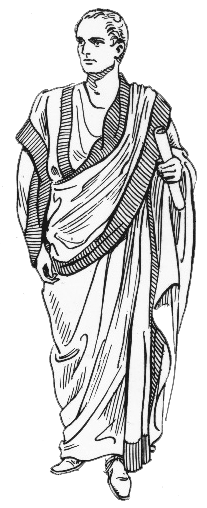 Apart from getting married, the day when a boy becomes a man is the most important day he will experience. Like most other Roman traditions, the entry into manhood was seen as a time of celebration and the Romans had a grand ceremony for all concerned.
Apart from getting married, the day when a boy becomes a man is the most important day he will experience. Like most other Roman traditions, the entry into manhood was seen as a time of celebration and the Romans had a grand ceremony for all concerned.
Until a boy was fifteen, he was treated as a child and as such had to dress in the manner of a minor. The customary dress for all Roman and Roman citizen children on official occasions was a white toga edged with purple, the 'toga of youth', a toga praetexta. This signified that the wearer was of a minor age and as such could not partake of the adult activities that were strictly controlled under Roman law. he was not allowed to enter bars, vote etc. The only adult activity he was allowed to do was to get married, as marriage was legal from the age of fourteen.
The Toga of Manhood
The 17th March each year was the day for the celebration of the festival of Liberalia, the god of fertility, and all institutions, businesses etc. were closed for the day. When a boy reached fifteen then there was a special ceremony that was performed on this day for each boy, when he received his 'toga of manhood' toga virilis which was totally white.
|
|
The day would start with him donning his new toga and dedicating his old toga along with his lucky charm bulla to the gods. The charm had been worn since he was nine days old, the time when the Romans named their children. Then in a grand display, his whole family would parade through the town towards the Forum, which was empty for the day.
Recognizing him as a Man
As he passed through the town the inhabitants recognised this as a special day for the boy and would call out greetings to him. Some would give him the Roman salute, and others would shake his hand, for they too had experienced this day and knew it's significance. This ceremony officially placed him on the register of full citizens and also have his name placed on the tribal roll. From there the whole entourage moved to the Capitol where a sacrifice of an animal was offered to the gods. then they all moved back to the boy's home for a long gathering of celebration. He was now recognised as a man.
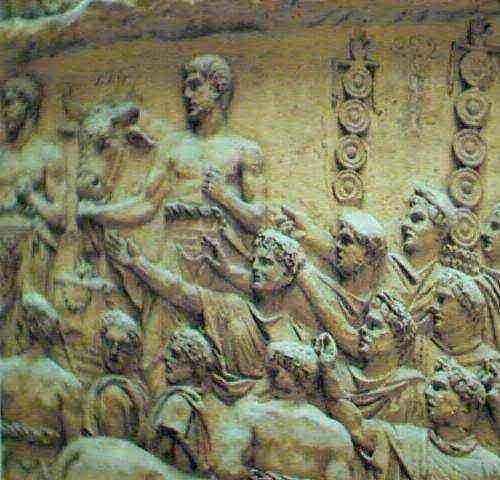
The Roman salute on Trajan's Column above and by a soldier below.
